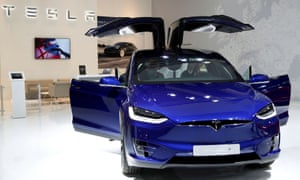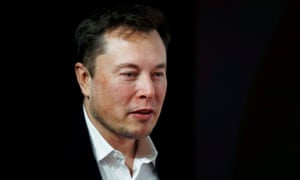Boxster Coupe GTS:
Can Tesla justify a $300bn valuation?
Elon Musk’s company is the world’s most valuable carmaker, but it has never made a profit...

(18 July 2020)
When Elon Musk tweeted in May that the share price of Tesla was “too high” at $780, it caused a brief moment of panicked selling by investors in the electric carmaker. Yet two months later Tesla had overtaken Toyota as the world’s most valuable carmaker in a remarkable rally in which its market value briefly topped $300bn this week.
Tesla has never made an annual profit but the company has a market value equivalent to a third of the combined US, EU and Japanese auto indices – despite an expected share of only 0.8% of the global auto market this year. That disconnect has prompted re-evaluation from some investors and euphoria for others as they try to work out if the carmaker can ever justify the heady valuation.
Small investors have been quick to jump onboard, with the share dealing service Robinhood saying the number of its accounts holding Tesla shares has doubled since June.
Analysts are often afraid to call a bubble, given the potential for egg on their face, but the share price surge to more than $1,500 (after briefly breaking above $1,700 on Monday) has made even Tesla optimists wary. The company’s valuation is more than 60 times analysts’ average expectations for core earnings in 2020. That multiple implies that Tesla will not only become profitable but that it will become the world’s dominant carmaker. Many do not think it will last.
“It is an irrational bubble,” said Matthias Schmidt, an automotive analyst who covers electric vehicles, “or perhaps more appropriately a massive tidal wave of investors irrationally investing in a brand with little knowledge of the business while shrewd, experienced market investors, perhaps going against all of their rational financial experience, are taking advantage, putting their wet suits on and riding the Tesla wave, boosting the price further.”
Analysts at Evercore ISI, an investment bank, referenced tulips in a note published on Tesla this week – an allusion to the tulip mania that stands among the cautionary tales for investors in any asset that enjoys such explosive price growth.
Yet as the Evercore analysts note, even if Tesla’s valuation appears “dislocated from traditional valuation metrics”, predicting if and when it will move back into line with the fundamental state of the company is a tricky proposition.
It is also potentially expensive. Short sellers have borrowed Tesla shares worth $20bn – the largest equity short ever seen – to sell on in the hope that prices will fall. Those investors hope to buy the shares back after the price has fallen but rapid increases in share prices can mean they are forced to abandon their bets at a painful loss.
Musk did not bother to disguise his glee at short sellers’ discomfort: earlier this month he sold a batch of red satin “short shorts” on Tesla’s website at $69.420 – a price deliberately linked to the “4/20” date on which many people celebrate cannabis consumption. Musk previously used the number in 2018 when he claimed he had agreed a buyout of Tesla at $420 per share.

Red satin ‘short shorts’ that Elon Musk sold on Tesla’s website to mock the carmaker’s doubters.
The touchpaper under the rocketing share price was lit in October, when the company surprised many investors with a quarterly profit and a bullish outlook. Shares suffered in March as the coronavirus pandemic hit but recovered as Musk – drawing a barrage of criticism that he was endangering workers’ health – kept his California factory open.
Tesla delivered more than 90,000 cars to customers in the second quarter of 2020 – beating expectations despite the disruption caused by the coronavirus pandemic to production and the huge job losses in many of its main markets. Tesla has also made progress in expanding its Shanghai factory to serve China, the world’s biggest car market.

Elon Musk kept Tesla’s California factory open despite the coronavirus pandemic
The share price move has left some analysts scrambling to keep up. The Piper Sandler analyst Alexander Potter this week raised his target price for Tesla from $939 to $2,322, citing faster than expected gains in market share, plus the opportunity of charging subscription fees for fully self-driving software updates – a technology considered to be some years away.
The company has also shown its commitment to constantly innovating and has built up an impressive advantage through its network of proprietary charging points, said Alyssa Altman, a consultant to transport and mobility companies at Publicis Sapient.
However, many automotive analysts remain sceptical. Tesla had an “open goal” in North America and Europe where major carmakers were unprepared to bring electric cars to market, Schmidt said. That has changed in Europe thanks to new carbon dioxide emissions limits. Volkswagen and the Renault/Nissan alliance have both sold more electric cars than Tesla in Europe this year as they race to catch up.
Tesla’s aggressive tactics also leave it more vulnerable than the more conservative incumbents to scandal. A German court gave a shot across Tesla’s bows this week, ruling the company’s description of driver-assistance features as “autopilot” was misleading. Governance concerns – such as watching Musk’s Twitter feed for securities law violations or potential libels – are also a big problem for a company that is so intimately linked with the personality of its billionaire boss.
Then again, separate Piper Sandler analysis suggests that mentions of Tesla on TV news are “fairly strongly” correlated with a higher share price. Controversy can have a payoff, whatever Tesla’s chances of auto industry domination.
Link: https://www.theguardian.com/technology/2020/jul/18/tesla-valuation-elon-musk-profit


It is impossible to accurately compare Tesla to the other automakers. Even in the JD powers survey they could not properly categorize the car.
While all the other car makers are fairly similar one needs to consider serval other things. Tesla does not sell just cars and their revenue streams are nothing like the ICE car makers. They are far more vertically integrated for one thing. They really are a software company, solar company and battery company - able to charge for items like software upgrades and other new sources of revenue like VPP brokerage in the future.
The other part of the comparison problem is that the ICE makers face a painful transition to manage the shift to EV. They are not EV companies and render many current tech investments useless as they proceed including huge investments in tooling etc. - not that this makes up for the huge imbalance in investments but it does explain why comparisons are not easy.



